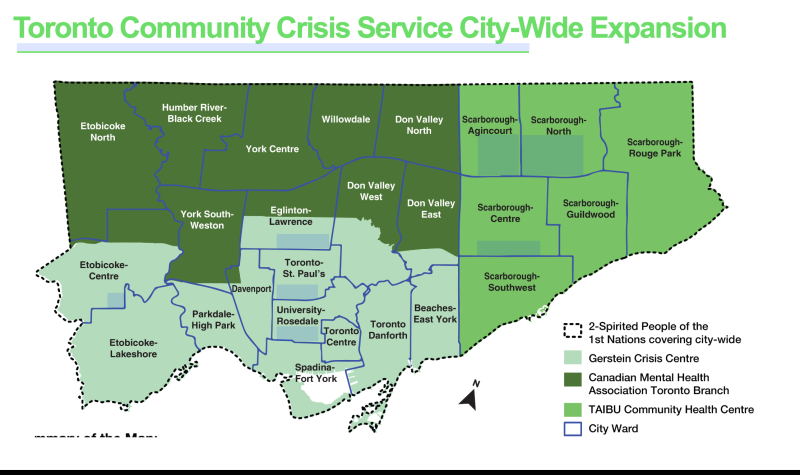A fourth municipal emergency service is being considered for the next city council meeting.
The Toronto Community Crisis Service (TCCS) is a pilot program that has been going on since 2022. It uses a team of crisis workers across the city to respond to non-emergency crisis calls and requests for well-being checks.
TCCS is the city’s undertaking “to treat mental health crises as a public health issue, not a public safety issue.”
At an executive meeting on Oct. 31, the committee voted to adopt the plan and expand to the rest of the city by the end of 2024. Currently, the program is only in four parts of the city: North Etobicoke, Scarborough, downtown West and East.
“By fall 2022, we have covered 64 per cent of Toronto Wards with a 24/7 service that is community based, client centred, trauma informed, non police led to support people experiencing mental health crisis and wellness checks,” says Denise Andrea Campbell, executive director of social development.
In their first year of service, they received 6,827 calls, with 54 per cent being received from 911 and the other 46 per cent being from 211 or other community sources. TCCS found that 211 is projected to slowly overtake 911 in calls being received. Of the transferred calls 78 per cent were handled without police involvement.
The response from the people who have used the line have been largely positive. TCCS found that 95 per cent were satisfied with the service they received. While 90 per cent said that this positively impacted “their perception of community safety and wellbeing.”
These evaluations were done by a third party: the Provincial System Support Program and Shkaabe Makwa with the Centre for Addiction and Mental Health collected this data from March 31, 2022, to April 30, 2023.
“Our model is partnership with trusted community agencies. They continue to build on the trust they have earned with Toronto residents so that residents and those who support them are learning to call 211, 911 and the partners directly. This service has and will maintain many doors to access,” says Campbell.
There are four partners currently in the TCCS pilot program: the TAIBU Community Health Centre, Gerstein Crisis Centre, 2-Spirited People of the 1st Nations and the Canadian Mental Health Association.
The plans for expansion have the four organizations have three growing past their current regions and for one to be city-wide. Gerstein would go from South Etobicoke to East York. TAIBU would remain servicing Scarborough and the Mental Health Association would service North Etobicoke and North York. 2-Spirited People of the 1st Nations would be the exception to the rule and be covering the whole city.
“With 78 per cent of calls being handled by the TCCS and not resulting in police involvement it reiterates what we already know. That people in Toronto experiencing Crisis should be treated with strong appropriate support in a community based way; and not be criminalised,” says Ausma Malik, councillor of Ward 10. “This is about saving lives and avoiding tragedy.”
More information about the TCCS and their date can be found on the Toronto City Website and infographic.
Listen to the story below:


